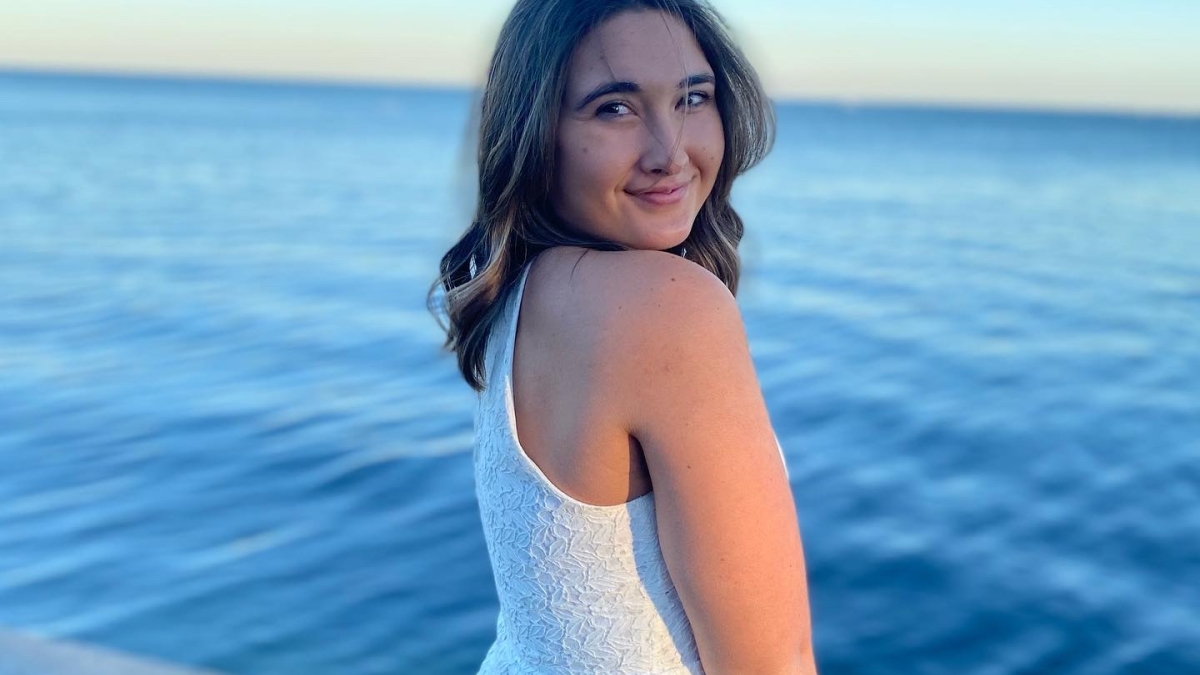Editor's note: This story is part of a series of profiles of notable fall 2021 graduates.
Growing up in Maine, Megan Osgood recalls taking trips to the beach with her mom and falling in love with the environment. From then on, she knew she wanted to study marine organisms, especially the environmental impact humans have on their ecology.
Osgood is part of the Starbucks College Achievement Plan, a first-of-its-kind partnership that creates an opportunity for all eligible Starbucks employees to earn their bachelor's degree through ASU Online. The program gave her the opportunity to pursue a degree in biological sciences (conservation biology and ecology) at the College of Liberal Arts and Sciences, putting her one step closer in turning her passion into a career.
“The Starbucks College Achievement Plan helped me achieve my educational goals by giving me the opportunity to broaden my degree scope while pursuing opportunities to further get my foot in the door,” she said. “I was able to begin working in my field and growing my experience beyond the classroom. Now as I graduate, I will have less debt than anticipated and a job already in place.”
During her time at ASU, Osgood’s fieldwork included working in the water-quality chemistry lab at the Southwest Florida Water Management District and participating in an internship in the Coastal Wetlands Research Lab of the Florida Fish and Wildlife Research Institute.
At ASU, she found the opportunity to finish her degree online and the time flexibility that enabled her to turn her internship into a part-time job. Osgood shares her experience and what the future holds for her after graduation.
Question: What was your “aha” moment when you realized you wanted to study the field you majored in?
Answer: My “aha” moment realizing I wanted to pursue a degree in biological sciences was while I was a kid climbing from rock to rock along the Maine coastline. In between each was a tidal pool full of a unique array of critters. I was fascinated by the ecology and their ability to persist in an ever-changing tidal environment.
Q: What’s something you learned while at ASU — in the classroom or otherwise — that surprised you or changed your perspective?
A: At ASU, I’ve learned how much an online forum can generate. Classrooms typically have an array of perspectives to be shared, and they don’t always come out in person. I’ve always found it easier to write out thoughts personally, and being able to have multiple conversations at a time allows each one to get appropriate thinking time. With scientific discussion especially, I think having adequate thinking going into your thoughts is essential. This sets up the skills needed when interacting with the scientific community through publications.
Q: Which professor taught you the most important lesson while at ASU?
A: I learned the most from my current professor, Dr. Travis Rusch, because he is teaching us to take things slow and focus on small things when conducting science. I am learning not to rush with observations and to think thoroughly when making scientific decisions.
Q: What’s the best piece of advice you’d give to those still in school?
A: The biggest piece of advice that I would give to those in school is to go after every available opportunity. I would not be where I am today if I had not applied for many internships, asked professors for research opportunities, and chosen to transfer into online courses at ASU.
Q: What was your favorite spot for power studying?
A: My favorite spot for power studying is a local shop in my town called Book and Bottle. This combination bookstore, coffee shop and wine bar provided a quiet space for me to work through coursework and take luxury reading breaks as needed.
Q: What are your plans after graduation?
A: After graduation, I plan to continue my work with Florida Fish and Wildlife within their Coastal Wetlands Research Lab gaining experience and traveling. I hope to pursue my graduate degree within the next year.
Q: If someone gave you $40 million to solve one problem on our planet, what would you tackle?
A: If I was given $40 million dollars to solve one problem on our planet, I would divide the cost in order to tackle marine conservation research and educational outreach. In order to solve the anthropogenic effects within the ocean, problem severity and direct causes need to be studied coupled with education for preventative measures. The current damage likely cannot be reversed; however, the progression can be halted with enough positive changes.
More Science and technology

ASU-led space telescope is ready to fly
The Star Planet Activity Research CubeSat, or SPARCS, a small space telescope that will monitor the flares and sunspot activity…

ASU at the heart of the state's revitalized microelectronics industry
A stronger local economy, more reliable technology, and a future where our computers and devices do the impossible: that’s the…

Breakthrough copper alloy achieves unprecedented high-temperature performance
A team of researchers from Arizona State University, the U.S. Army Research Laboratory, Lehigh University and Louisiana State…


